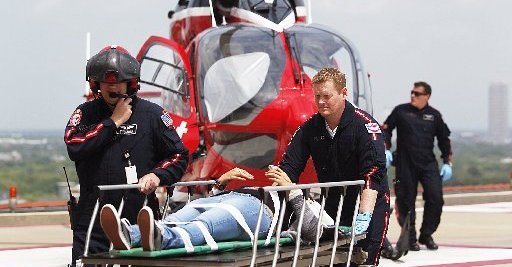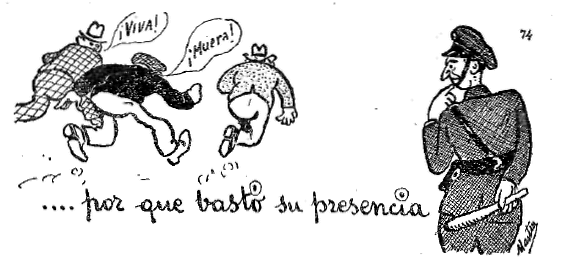
| Языки :: Испанский |
| Аудио |
 |
|
|
213 |
Español |
Spanish |
|
Lección Setenta y cuatro (74) |
||
| ¡Y dale con los médicos! (1) | [And] give it to the doctors again! | |
| 1 |
El marido y la mujer están enfermos. El médico, después de una larga visita : |
Husband and wife are ill. The doctor, after a long examination [visit]: |
| 2 | Temo que van a quedar viudos los dos. | I am afraid that they're both going to remain widows! |
| 3 |
¡Pobre doctor! Quería que le hubieran enterrado entre sus clientes y no ha sido posible cumplir su última voluntad... |
Poor doctor; he wished they should bury him among his clients, and it has not been possible to fulfill his last will. |
| 4 |
¿Por qué? — Porque ya no quedaba sitio. |
Why? — Because there was no room left [remained no r.]! |
| 5 |
¿Cómo está Fulano? — Le han abandonado los médicos. |
How is What's his name? — The doctors have given him up. |
| 6 |
¿Está moribundo? — No hombre. Está curado por completo (2). |
He's dying? — No, indeed, he has completely recovered [is healed for complete]! |
| 7 |
Una señora muy fea se pone (3) gravemente enferma y su marido llama al médico. |
A very ugly lady falls [puts herself] seriously ill, and her husband sends for the doctor. |
| 8 |
Su señora de usted — dice éste — no me gusta nada. — Ni a mí tampoco. |
I don't at all like the look of your wife, said the latter. — Nor I either. [Your w. docs not please me. — Nor me, either.] |
| 9 |
Dicen que este país es muy malsano. — Será cierto, pero para mí es el mejor del mundo. |
They say that this country is very unwholesome. — It will be right, but, for me, it's the best in the world. |
| 10 |
¿Cómo? — Sí, señor, soy el médico del pueblo. |
How('s that)? — Yes, sir; I'm the doctor of the place. |
| EJERCICIOS | |
| Lectura — incidentes callejeros (1). | |
| 1 | Anoche a eso de las nueve (2) se formaron varias manifestaciones de jóvenes, que recorrieron algunas calles céntricas profiriendo gritos sediciosos contra el régimen, |
| 2 | Una de estas manifestaciones, la más numerosa, se formó en la calle de la Montera y llegó hasta la Puerta del Sol, |
| donde fué disuelta por guardias de asalto, | |
| que no tuvieron (3) necesidad de intervenir, porque bastó su presencia para que se disolvieran los manifestantes. |
| NOTES. | |
| 1 |
Dar con... " to give with ", fall upon, find, come across.
He dado con lo que buscaba, I have found (encontrado) what I was looking for. — ¡ Dale ! or ¡ Dale que dale ! " give it to him! ", go it! |
| 2 | Or: completamente curado, or curado del todo. |
| 3 | Or cae. |
|
¡ No se vaya usted! siempre que viene nos hace
visita de médico! Don't go! every time [that] you come you pay [do] us a doctor's (i.e. very short), visit. Tiene letra de médico : he has a doctor's (i.e. illegible) handwriting. — La letra : 1) the letter (in the alphabet) ; 2) the handwriting; 3) the words, libretto, la letra de una canción, de una ópera. |
|
|
(1) Callejear : to loaf (about the streets); callejero, loafing; a loafer. — (2) A eso de las nueve = cerca de or alrededor de las nueve. — (3) No tuvieron : had not (Infinitive : tener). |
|
|
From now on, we stop indicating, the stress by a fat letter, in order to
let you get used to regular Spanish text. See lesson 7, paragraph 2, |
